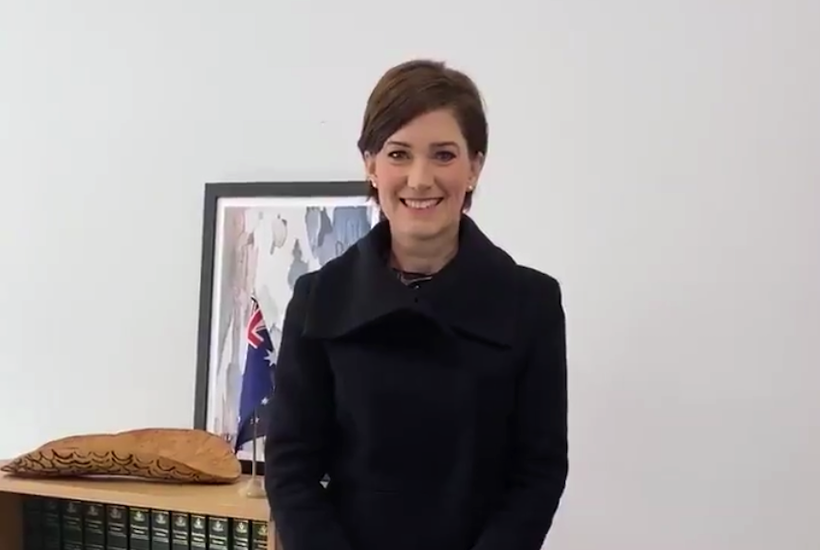South Australian Liberal Nicolle Flint caused a stir on social media at the end of last month when she released a scathing video denouncing the sexist critique of her electorate newsletter by a long-serving ABC announcer. In a newspaper column Peter Goers, the occupant of the evenings slot on ABC Radio across South Australia, attacked the Boothby MP for wearing pearls and having a pearly smile, an array of different coloured blazers; and, most ridiculously, for wearing black pants which expose her ankles, rather than discussing her political views or contributing meaningful discussion to the national political debate. Flint, a PhD in political science, riposted with a video speaking on the incident which finished with her removing her coat to reveal she was wearing a garbage bag to match Goers’ “rubbish views”.
This spirited response very effectively called out such reductive comments on her appearance for what they were: targeted, degrading, and sexist evaluations of a woman in politics who happens to take different policy positions to Goers’ preferred issues. Goers’ supposed shaming of a women with whom he disagrees based on their appearance is emblematic of a broader problem in the left’s approach to gender politics with women who don’t share their ideological perspectives.
Third wave feminism demands that women be treated with respect and their ideas be based on merit, rather than their gender. However, it seems this rule only applies when that woman in question adheres to progressive ideological standards. For when the woman happens to lean right or even (equality forbid!) openly identifies as conservative, it becomes acceptable to target them on the basis of their gender – and thus avoid giving merit to their ideas and treating their views as unworthy of discussion.
Unfortunately, the double standards of the left towards women are even more prevalent within the university setting, where young conservative women are frequently targeted and have their views invalidated by their peers and even by their professors and tutors.
All too often, once a female conservative expresses her views in a classroom setting, they become targets. Charlotte Choi, a student at the University of Melbourne, told us: “Being a conservative woman, I’ve luckily found acceptance among friends of the same persuasion. However, others I’ve met have been bemused that a female immigrant of Hong Kong descent prefers individualism over collectivism, traditional values over modern ones and social continuity over an atomised, discontinuous society.”
Ms Choi believes that the imposition of leftism and feminism on young women of colour is toxic and exploitative, saying, “The left goes as far as suggesting that one’s ethnicity or gender should determine what you believe. Women of colour who don’t buy the radical left’s cause must be exploited by the system, have pledged alliance to ‘patriarchy’ and be racially oppressed – and must be misinformed about their views. So much for advocating for equality – when conservative women of colour aren’t welcome to the debate.”
The idea that if a woman, especially if she is young or a woman of colour, holds conservative beliefs, it must be because of some kind of internalised sexism or a lack of compassion, is an insult to the intelligence and individuality of young women everywhere.
It is a great shame of modern feminism that it has become an ideology of collectivism which rejects diversity of thought; it is the most enormous disservice which can be done to a young woman to tell her what her beliefs should be simply because she is a woman. This identarian approach to politics is greatly damaging. For a motivated, intelligent, politically outspoken woman to have her views reduced to gender is reductive and grossly insulting.
In an age where the left claims to empower historically marginalised and dispossessed groups, identity politics is silencing the voices of Conservative women on our campuses – and stifling essential conversations and learning. Within university classrooms, conservative women are dismissed, mischaracterised, or marked harshly for expressing their viewpoints in an environment where free-flowing debate, inquiry and a spirit of curiosity should be heartily encouraged.
Tamara, a Commerce student from Macquarie University, was almost failed by a tutor on a subject for questioning the gender pay gap. “I simply expressed that women may choose to work less for their kids or pick jobs that are flexible with their family lifestyle…the girls were outraged – as if I had betrayed the group… I’ve learned over time to write assignments with the left view in mind so as not be marked badly!” Tamara further argues “I’ve been raised to believe that my gender isn’t a barrier and that the adult world rewards you for your hard work.” Tamara’s comments ring true of the impact of modern feminism on identity politics and its rhetoric of concentrating on women as vulnerable, mistreated victims struggling through a web of patriarchy. It degrades the gains that previous generations of women have fought for and the individual freedom, personal agency, and political autonomy they enjoy today.
Similar to Tamara, Rachel, a law student at Macquarie University, was dismissed as “blind and optimistic” by a law tutor after she stated that she has “never felt any sort of discrimination in the legal job market as a woman” and that she “had never been paid lower than any of (her) male peers.” None of her peers spoke up in fear of being marked down or ridiculed. Another female student who has chosen to remain anonymous was “marked down on assignments simply for questioning the socialist ideas of economists and philosophers.” It was only after she stopped questioning these views did her marks improve. The damaging effect of identity politics has meant that conservative women who do not share experiences of oppression or refuse to support stereotypical “women issues” are labelled as anti-woman, anti-equality and anti-human rights by the intolerant Left. It re-affirms a dangerous culture on our university campuses of stifling debate. Students of opposing persuasions do not feel comfortable to speak out and oppose the staunch political values or views of their tutors or peers.
Renee Gorman, the National Manager of Generation Liberty, says that these stories are unfortunately all too common, “I engage with young women who are conservative or libertarian all the time through my work with young people at the IPA, and they inevitably have a story about being spoken down to in a tutorial or even being harassed on campus… It’s the double standard that infuriates me.” She went on to explain the harassment she suffered when she rose to prominence on campus after showing the film The Red Pill, at the University of Sydney in 2017. “After that event, I had fully grown men from the far left follow me around on campus, shout abuse at me when they saw me and even attempted to put glue in my hair. The most frustrating part is that I knew nothing would be done if I reported it
Double standards felt by conservative female students is perpetuated by the liberal left media across our democracies. In the United States, progressive women like comedian Chelsea Handler mock the appearance of Republican women like former White House Press Secretary Sarah Huckabee Sanders – while simultaneously describing herself as a champion of the women’s empowerment movement. Michelle Obama told a crowd that any woman who voted against Hillary Clinton voted against their own voices. At the same time, Hillary herself purported that women who did not vote for her were bullied by men. These women who describe themselves as feminists, ironically infer through their comments that women cannot be empowered to think for themselves and form their views independently.
There is a concerning stigma around conservative, libertarian, and centre-right women, which has resulted in many of them feeling belittled and afraid to speak out, even in forums where intellectual freedom and discourse should be encouraged. Despite this, we have seen an increasing number of young women, especially from the upcoming generation, Gen Z, willing to speak their mind and challenge the left’s orthodoxy. As well as some high-quality rising stars in parliament such as Nicolle Flint MP, Senator Amanda Stoker and Senator Claire Chandler.
One of the positives of this double standard is that it highlights the insincerity of the far lefts’ dedication to female empowerment. Once a young woman strays from the radical left agenda and gets told she can’t think that or can’t say that in a tutorial, some may give in. Still, many of them will have a small revelation and realise the truth – that the far left only cared about their voice when they agreed with them. There couldn’t be a more sure-fire way to turn a strong-minded woman against your cause.
Theodora Pantelich and Anjali Nadaradjane are IPA Campus Coordinators with Generation Liberty. Join Australia’s biggest youth liberty movement here.
Illustration: Nicolle Flint/Twitter.
Got something to add? Join the discussion and comment below.
Get 10 issues for just $10
Subscribe to The Spectator Australia today for the next 10 magazine issues, plus full online access, for just $10.


























Comments
Don't miss out
Join the conversation with other Spectator Australia readers. Subscribe to leave a comment.
SUBSCRIBEAlready a subscriber? Log in